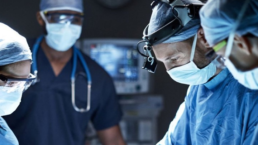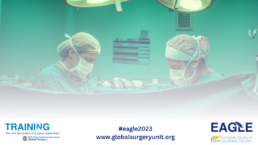EAGLE 2 has launched!
Following on from publication of the EAGLE study last year, we are pleased to announce the launch of EAGLE 2.
EAGLE 2 will be a snapshot audit of patients undergoing right sided bowel anastomosis, but restricted to units who undertake the EAGLE online training. This training may have already been done (as part of the first EAGLE study), or surgeons in your team may complete it between now and May 2024. A key finding from the EAGLE study was that in centres where most surgeons undertook the training, the anastomotic leak rate fell by almost 50%. We need your help to grow engagement across as many hospitals as possible, so we can validate this finding. EAGLE 2 will be open to hospitals who participated in the original EAGLE study as well as new hospitals.
Units who undertake the EAGLE online training (either as part of ’EAGLE’ or between now and May 2024) prior to data collection can take part. The anticipated audit period will be May/June 2024. Results will be presented at ESCP 2024 in September, and published later this year.
You can find out more about the EAGLE study in the below video:
If you have any questions, please contact the team.
Checklist Developed by the GSU could Help Surgical Teams Prepare for Summer Pressures
Checklist developed using data from GreenSurg Collaborative led survey could help surgical teams in low- and middle-income countries to prepare for issues relating to global warming.
The “Operating Theatre Heatwaves Checklist” has been developed by researchers to summarise four key points that should be taken into account by clinical operation based teams when looking at the development of strategies to reduce any issues arising from prolonged periods of abnormally hot weather. The team were able to analyse data from 20 specialities across 140 UK hospitals that operated during the UK heatwave of July 2022.
From the data that was analysed during the study, the checklist asks the following questions which should be taken into account when looking to reduce the impact from prolonged periods of excessive heat:
- Do you have an operating theatre heatwave plan?
- Can your operating theatres function during heatwaves?
- Do you have a plan in the case of staff shortages?
- Is there a heatwave-related surge in emergency admissions – can surgical activity be maintained?
Members of the research team were able to present the checklist at the Faculty of Public Health Climate and Health Conference, taking place on the 21st June with a focus on the subject of “Adapting to a warming world from the UK perspective”, attended by a multitude of of professionals from the food systems, built environment and healthcare international industries.
The United Nations defines Climate Change as long-term shifts in temperatures and weather patterns that have been primarily driven by human activities, particularly since the 1800s. As climate change intensifies, the ramifications of raising temperatures (one of the effects of elevated greenhouse gas emissions derived from the burning of fossil fuels) will have a direct impact on us all, with the global healthcare sector being particularly prone to issues arising from increasing global temperatures.
You can view the full checklist by clicking here.
You can also view the original GreenSurg publication Elective surgical services need to start planning for summer pressures, published in April 2023 by clicking here.
Education and Training Webinar: EAGLE Study Video Available Online
You can now view the video from the online webinar that took place on Monday 5th June on the NIHR Global Health Research Unit on Global Surgery (GSU) Youtube channel
Anastomotic leak is a severe, potentially life-threatening complication following right colectomy. Internationally, anastomotic leak occurs after 8% of right colectomies. Prospective cohort data demonstrate that patient selection, intraoperative factors, and technical variation are risk factors for anastomotic leak. EAGLE was an international quality improvement programme to share best practice and harmonise procedures for surgeons and the theatre teams so that they might perform the best possible anastomosis for each particular patient. The study was carried out by 350+ hospitals across more than 60 countries.
The online webinar video chaired by Prof. Dion Morton provides all those working in surgical practice and research with an overview of the ground breaking global study EAGLE which is due to be published soon. The hour long video includes the following highlights:
- Study background – ESCP RH Audit
- Panel Discussion – Why is a Study Required?
- EAGLE Study Design
- EAGLE High Level Results
- Breakout Room – Introduction to Research Methodology
- Panel Discussion – Could the QI Intervention be Implemented in Practice?
- Future Directions
You can view the video by clicking here.
More information on EAGLE can be viewed by clicking here with further information on the Education and Training Programme viewable by clicking here.
Education and Training Webinar: EAGLE safe-anastomosis study
New webinar will look at the results from the recently completed EAGLE study
When is it?: Monday the 5th of June 2023 – 11:00 & 18:00 (GMT) – A 1hr webinar repeated twice during the day.
Who should attend?: Surgeons, surgical researchers, surgical nurses, scrub techs, ODPs and allied healthcare professionals
Hosted by: NIHR Global Health Research Unit Hashtag: #eagle2023
Anastomotic leak is a severe, potentially life-threatening complication following right colectomy. Internationally, anastomotic leak occurs after 8% of right colectomies. Prospective cohort data demonstrate that patient selection, intraoperative factors, and technical variation are risk factors for anastomotic leak. EAGLE was an international quality improvement programme to share best practice and harmonise procedures for surgeons and the theatre teams so that they might perform the best possible anastomosis for each particular patient. The study was carried out by 350+ hospitals across more than 60 countries.
This online webinar chaired by Prof. Dion Morton will provide all those working in surgical practice and research with an overview of the ground breaking global study EAGLE which is due to be published soon.
The main session will include three key presentations on (1) background and impact of anastomotic leak, (2) the design of the EAGLE study and (3) the headline results of the EAGLE study.
The format of the event includes a panel presentation of global experts discussing how the research was conducted, what the results showed, and the potential impact on surgical practice. There will be breakout sessions looking specifically at 2 key perspectives on the research (1) research methodology and results and (2) process evaluation. The webinar will conclude with a round table discussion of global experts discussing how these results can be implemented across the globe.
Register now to attend this ground breaking event
Register for the 11:00AM (UK BST) session using this form.
Or the 6:00PM (UK BST) session using this form.
You can also view Professor Dion Morton deliver a short promotional overview of the upcoming webinar by clicking here.
For instructions on how to use the Zoom meeting portal, desktop/ PC users click here for more information and iPhone/ Android users click here for further info.
GECKO International Study Formally Launches
Global Evaluation of Cholecystectomy (GECKO) will look to define the global variation in compliance to pre-, intra-, and post-operative audit standards
Cholecystectomy is amongst the most common surgical operations performed worldwide yet there is still insufficient evidence around the variations of safe provision of laparoscopic surgery for gallbladder disease internationally, including low- and middle-income countries.
In addition to the primary aim of the study, GECKO will also look at the following:
- To determine the quality of safe provision of cholecystectomy, including the rates of: (i)
achieving a critical view of safety; (ii) intraoperative imaging use (e.g., cholangiogram); and (iii) initiating of different bailout procedures (e.g., subtotal cholecystectomy) when safe
cholecystectomy is compromised. - To assess adverse events following cholecystectomy (e.g., bile duct injury) and their
management. - To analyse rates and outcomes of unsuspected gallbladder cancer.
- To evaluate the global variation in the availability of cholecystectomy services and training
amongst included hospitals. - To assess sustainable practices in laparoscopic cholecystectomy globally.
The study will span over 8 separate 2 week data collection periods starting 31st July, ending on the 19th November 2023.
You can view the study summary video by clicking here.
You can also view further information on the study by clicking here.





